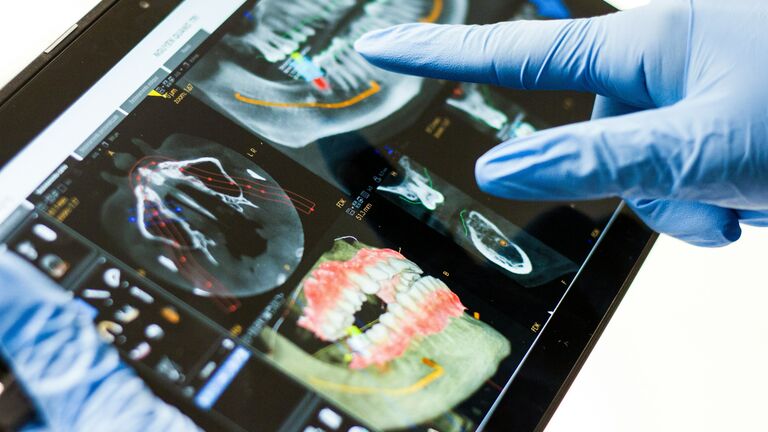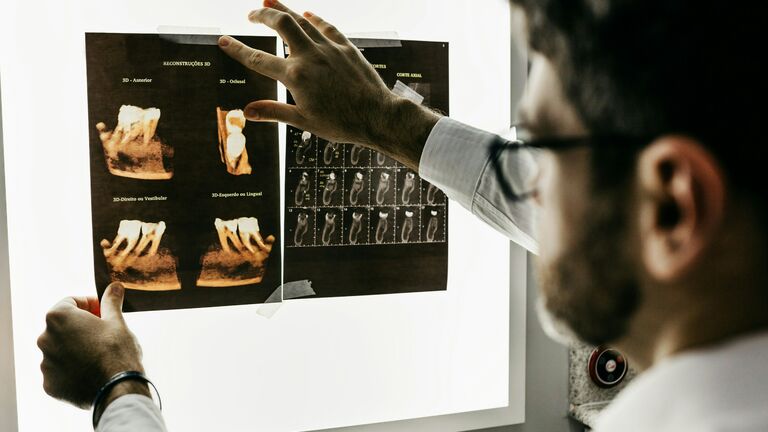
How Does An Implantologist Differ From A General Dentist?
If you’re curious about dental implants, the first step will often be to talk to your regular dentist about the process. If they think you could be a good candidate, they might refer you to an implantologist for the procedure.
But what exactly does this mean? And why can’t your usual dentist carry out this treatment? In this guide, we’re exploring the difference between a dentist and an implantologist and how you should choose the right person for your treatment.

What is an implantologist?
An implantologist is a dentist who has taken additional training to learn how to carry out dental implant treatment. Dental implants are not a standard part of dental training, so extra learning is required to be able to carry out this treatment.
The process for becoming an implantologist starts with qualifying to become a dentist. It’s then common to work as a general dentist for a while to build your experience. After a few years in the profession, a dentist may then decide it’s time to expand their knowledge.
Postgraduate qualifications in implantology will take between 18 months and 3 years, depending on whether the dentist studies full time or part time. The most common qualifications will be a Master’s degree (MSc) or a postgraduate diploma (PGDip).

What do implantologists do?
Once qualified as an implantologist, many will focus their practice on this treatment alone. This means they will no longer offer general dentistry such as fillings and extractions, but some might continue offering both types of dental services.
An implantologist manages the dental implant treatment from start to finish. This will include meeting with patients during initial consultations to determine if they might be good candidates for treatment.
They will take X-rays, CT scans and digital scans in order to create the treatment plan. If there is insufficient bone structure, they might plan a bone grafting procedure. They will also carry out the dental implant procedure, including placing the implant, abutment and the final restoration.
And finally, implantologists will also provide aftercare support for patients to ensure they can take good care of their implants.

What questions should I ask my implantologist?
If you’re thinking about dental implants it’s important to choose the right implantologist. Firstly, steer clear of anyone that describes themselves as a dental implant specialist. This isn’t an official job title and could suggest they are unfamiliar with the marketing rules set out by the General Dental Council (GDC).
Check their credentials and ask to hear more about any training they have completed. Remember that it’s possible for dentists to take short courses in dental implants, or they can take extended courses to become an implantologist.
And finally, ask to see evidence of their past work. This could include reviews from previous patients and case studies. Ask them about their success rate with all dental implants, and then their success rate with dental implant cases that are similar to your own.

Do I really need to see an implantologist?
Since dental implants are a surgical procedure and there is a risk of failure, you should aim to work with the most experienced dental implantologist available to you. Your regular dentist may be capable of placing dental implants, but there might be dentists with more experience with this challenging branch of dentistry available to you.
You will need to decide if working with a dentist who is familiar to you is more important than working with an implantologist with more extensive experience. Often, you can be referred to a dentist within the same practice, so you will at least have some level of familiarity.
Call us to make an appointment
We are accepting new patients and our team are here to help
Call us now
Teeth Whitening Offer £270
Teeth Whitening and Hygiene offer for £270 until end of April 2021.

Invisalign FREE teeth whitening
Invisalign FREE teeth whitening
02.05.2024
Signs of a Failed Dental Implant

08.04.2024
5 Signs You Should See an Endodontist

Call us to make an appointment
We are accepting new patients and our team are here to help
